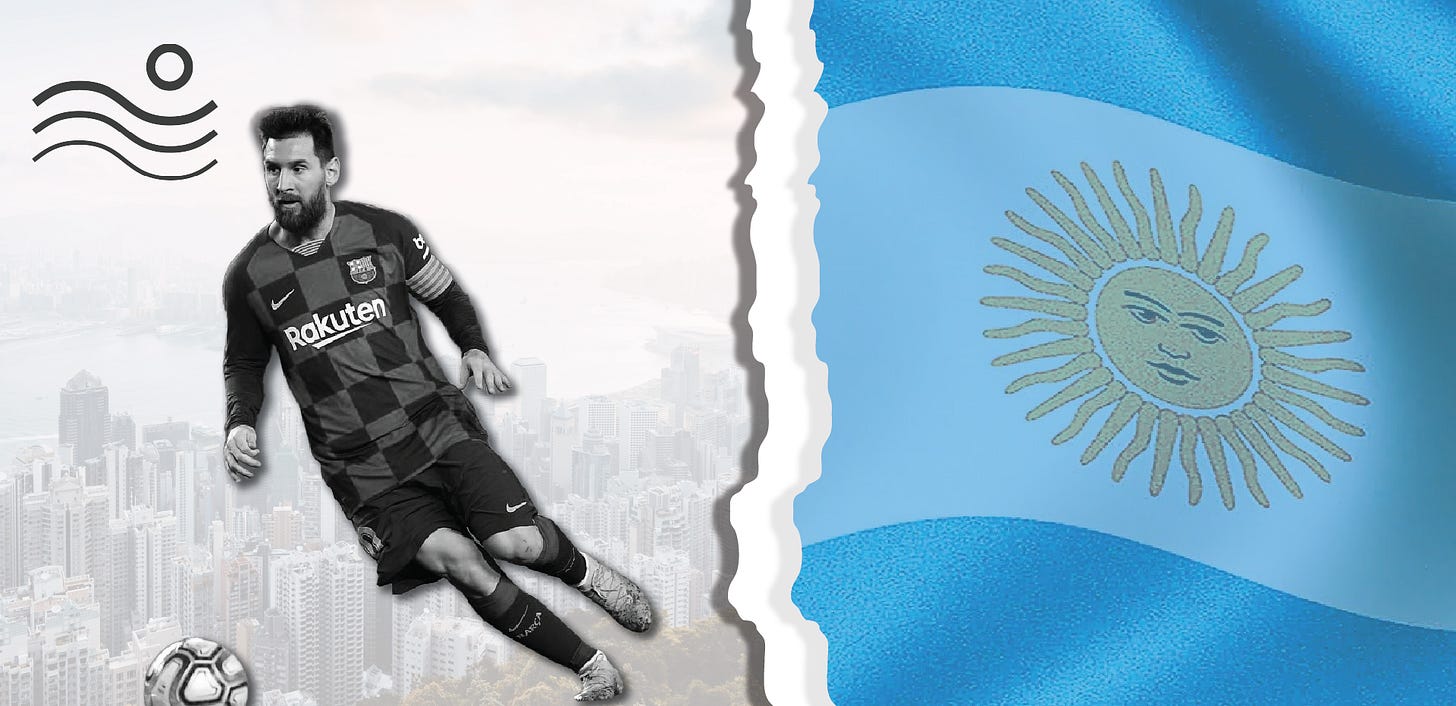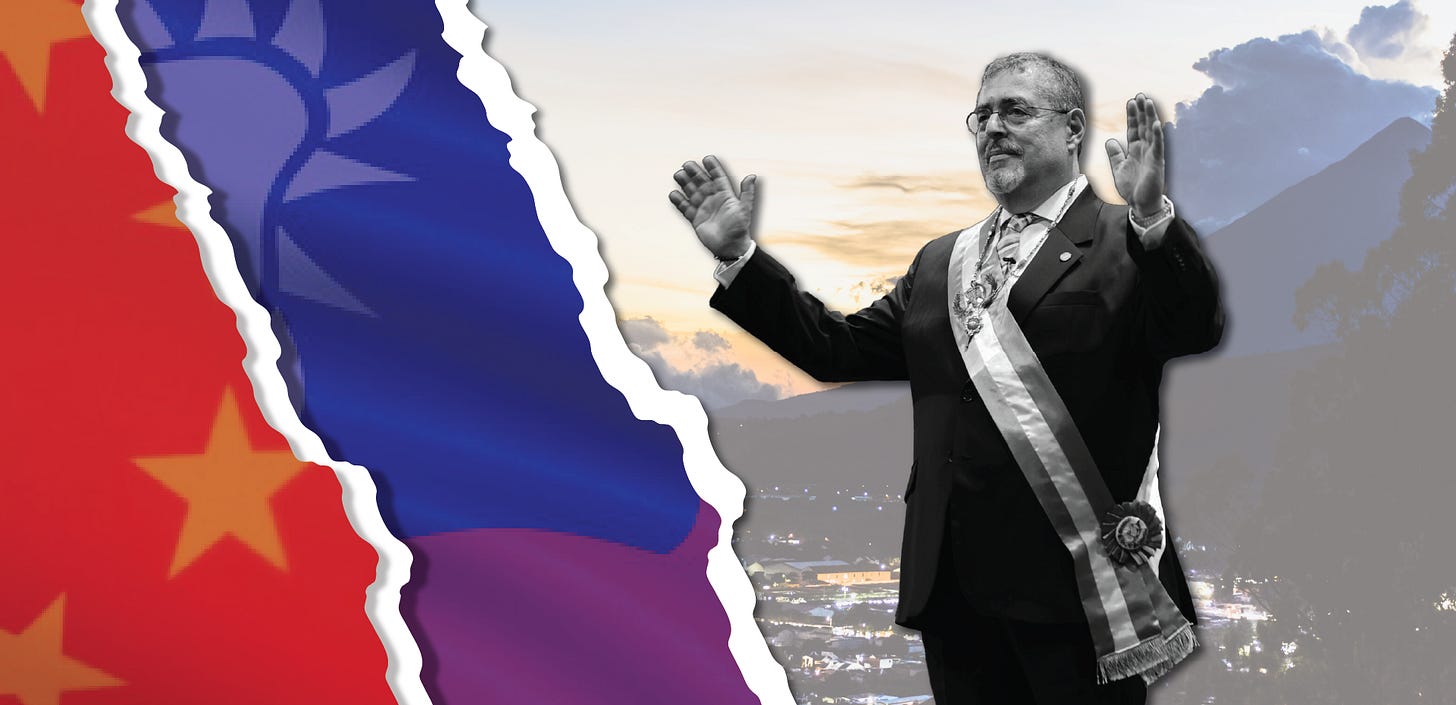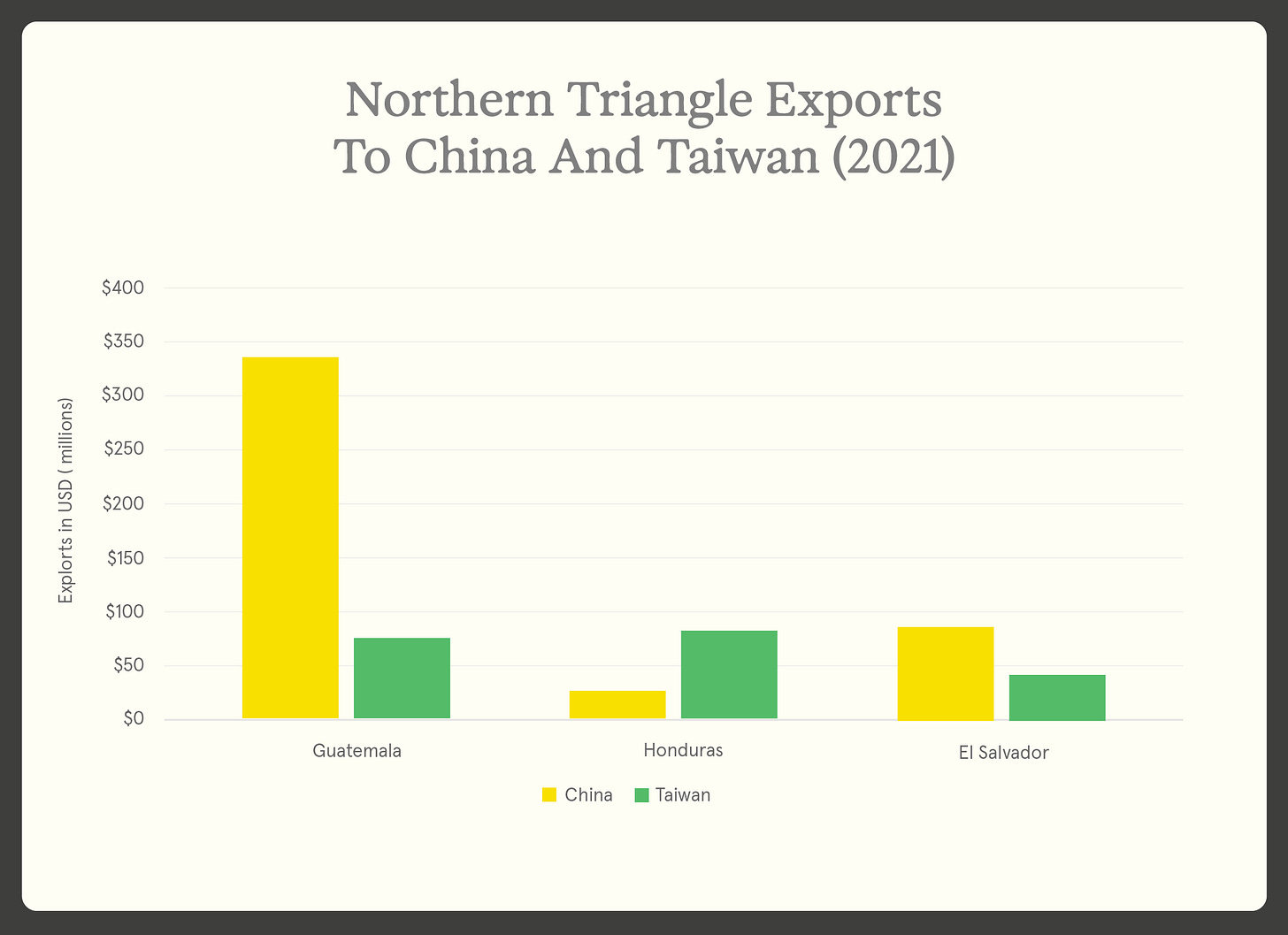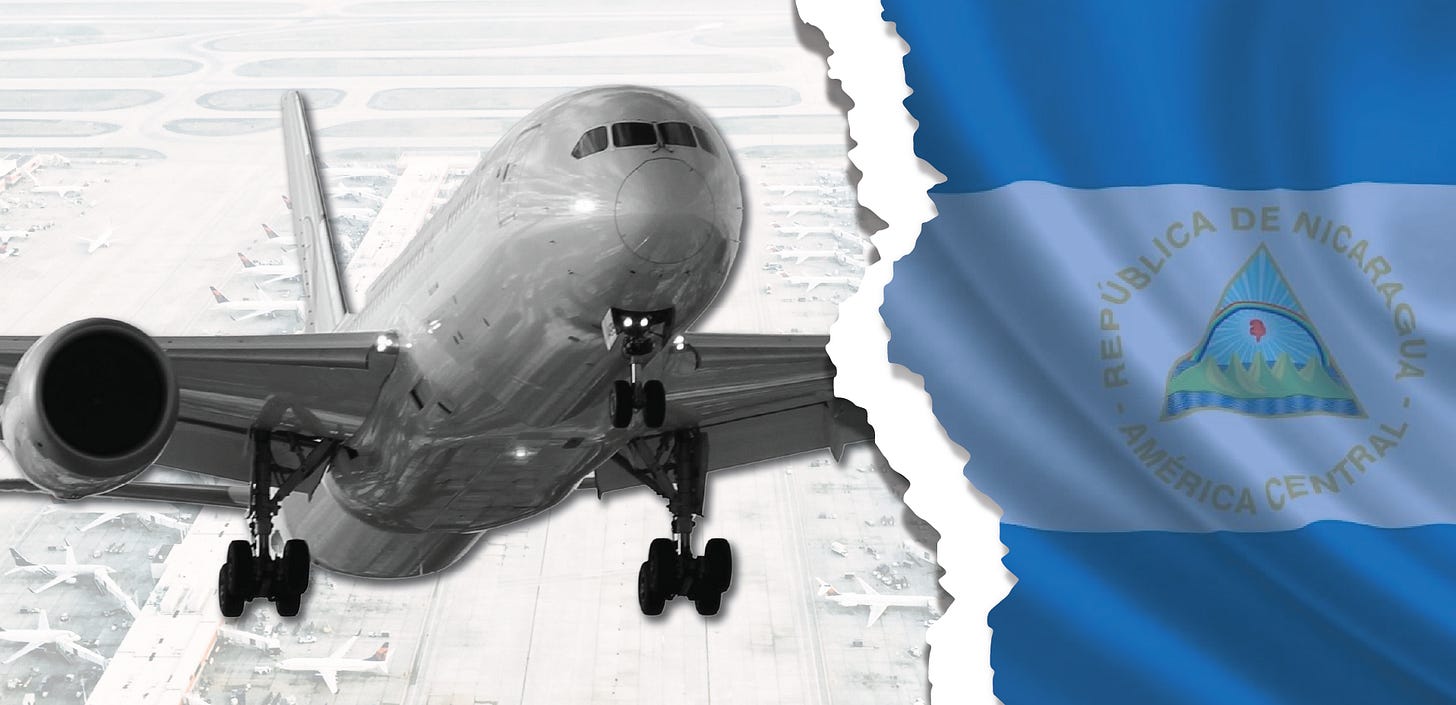Critical for Development
Guatemala seeks China trade, a Messi soccer dispute, Ecuador and Honduras FTAs, and Sino-Canadian tensions over Taiwan
Welcome to Chaufa, a China-Western Hemisphere Newsletter by CPSI.
Today’s Edition covers February 5 to February 18.
The Top 5 Stories:
Guatemala’s foreign minister suggested that his country would try to establish “formal trade relations” with China while maintaining diplomatic relations with the ROC, though a PRC foreign ministry spokesman denied that trade relations would improve without a flip in recognition. The Taiwanese foreign ministry protested the PRC foreign ministry’s comments in response, and President Arévalo later backtracked on the comments.
At the same time, the president of the Guatemala-China Chamber of Cooperation and Commerce gave an interview to CGTN praising existing (but limited) Guatemala-China trade ties.
Newly-inaugurated President Bernardo Arévalo has repeatedly stated his intent to maintain recognition of Taipei.
Argentina’s soccer (football, sadly, for those non-Americans) superstar Lionel Messi caused an uproar in China after he did not play in an Inter-Miami match in Hong Kong, possibly due to an injury. In part because he played in Tokyo days just later, local Chinese authorities canceled two planned friendlies in Beijing and Hangzhou.
The Global Times unsurprisingly took a very aggressive stance on the issue, publishing an editorial claiming that the “impact of this incident has far exceeded the realm of sports.”
Ecuador’s national assembly approved the country’s Free Trade Agreement with China, which President Noboa ratified on February 15th. The agreement is due to go into effect about 90 days after Noboa affirmed the agreement’s ratification.
The agreement was signed last May under the previous Lasso administration, and it is expected to allow 99.6% of Ecuadorian products to enter China under preferential trade terms.
In an interview, China’s Ambassador to Ottawa tied the prospect of improved relations to Canada’s Taiwan policy, saying “We firmly oppose any provocative actions, especially on the Taiwan question. Anything that runs contrary to the One China principle — that’s dangerous.”
The statement comes as 20 MPs in the Canada-Taiwan Parliamentary Friendship Group issued a letter to ICAO that lodged a formal complaint against China on behalf of Taipei.
The Chinese and Honduran governments officially signed an Early Harvest Agreement for their bilateral FTA negotiations. (Global Times)
The news comes as China’s customs ministry announced it was expediting approvals for Honduran coffee producers.
Core Brief
Guatemala (probably) won’t be a Honduras repeat
After the Guatemalan foreign minister’s recent suggestion that his country would seek to expand trade ties with the PRC, some suggested that Guatemala could be possibly about to follow Honduras’s footsteps and flip ties. However, as subsequent reporting has borne out, the two neighboring Central American countries are quite different, so a hint at more trade with the world’s second-largest economy does not necessarily presage a change in the Taiwan-Guatemala relationship.
First, Honduran President Castro and Guatemalan President Arévalo handled the China issue differently in their presidential campaign. Castro actively campaigned on switching ties and only held back once she was inaugurated. Arévalo, by contrast, repeatedly reaffirmed his commitment to recognizing Taiwan throughout the campaign and presidential transition.
Second, Castro’s and Arevalo’s relationship with Taipei’s biggest international backer, the United States, is quite different. Though Washington held high hopes for Castro at the beginning of her term, relations have become increasingly strained over the past few years as Tegucigalpa has sought closer ties with Cuba, Nicaragua, and Venezuela. Additionally, State Department complaints against some of the Castro administration’s domestic actions have made the relationship more tense.
By comparison, Arévalo was able to overcome Guatemala’s structurally corrupt political system in large part due to the Biden Administration’s strong support, and so far, relations still appear strong.1 Though Washington’s influence could wane if U.S.-Guatemala relations similarly deteriorate, and Guatemala could also decide to flip recognition independent of strong relations with the U.S., current friendliness between the two countries generally suggests a continuation of the status quo.
Third, unlike Honduras, Guatemala already exports way more to China than it does to Taiwan, though these trade flows remain fairly marginal. This is more of a mixed basket, as this could indicate the promise of the Chinese market and give Beijing more leverage, but it could also show that export gains might be marginal in the short term. According to the Organization for Economic Complexity’s data, Guatemala exported more than four times as much to China than Taiwan in 2021, unlike Honduras which was exporting almost three times as much to the ROC than the PRC. Though an imperfect comparison, El Salvador was only exporting less than twice as much to China as Taiwan three years after San Salvador recognized Beijing.2
Of course, the PRC’s attraction as the world’s second-largest country and economy is strong, so Arévalo may yet turn to Beijing to lift a flagging economy and make a major diplomatic splash. This is further compounded by the fact that the administration’s plans to expand trade ties will likely hit the brick wall of Chinese intransigence. Beijing holds all the cards, and it will be unlikely to make concessions without gaining Guatemala City’s formal recognition.
The White House gets a new China-Americas Expert
It was reported this past week that President Biden’s top Western Hemisphere advisor, Juan Gonzalez, would be stepping down from the National Security Council in favor of Deputy Assistant Secretary of Defense and long-time Biden aide Daniel Erikson. Though Erikson has most recently been making news by engaging on LAC-centric security and defense issues, like Venezuela’s threats against Guyana, he has long had a focus on the China-Americas relationship.
Erikson started his career at the DC-based Inter-American Dialogue, where he spearheaded research efforts on China-LAC and Taiwan-LAC affairs just as the PRC was expanding its economic reach in the region. During that time, he wrote extensively on China-Americas, especially China-Caribbean, ties. Notably, he penned (with Janice Chen) an influential article on China-Taiwan-LAC affairs, where he presciently argued that Taiwan was a crucial dimension of China’s regional foreign policy and could eventually force Washington to act in Taipei’s favor. He also notably argued nearly two decades ago that China’s growing attention to the Caribbean may force the United States to pay more attention to the sub-region.
In recent years, Erikson has expressed limited skepticism towards China, indicating he would continue being a proponent for targeted competition against China inside the Biden Administration. For example, he said in a 2019 interview that “China can be a very important partner for Latin America… but it is also very important that the Latin American people and their leaders enter into an agreement with China with their eyes open… [because] China does not play with the same rules with companies in Europe and the United States or Latin America.”
As the saying goes, personnel is policy. Though Erikson likely wasn’t selected just for his China knowledge (his Biden ties and LAC expertise goes far beyond that), he brings a depth of experience that will likely inform a nuanced U.S. strategy towards China’s regional influence for the final year of Biden’s first term.
The Roundup
Politics and Society
President Xi issued statements over the past two weeks congratulating Nayib Bukele on winning El Salvador’s presidential election and sending condolences on the news of former Chilean president Pinera’s death. (Xinhua) (China Daily)
Meeting on the sidelines of the Munich Security Conference, China’s and Argentina’s foreign ministers discussed bilateral relations, economic development, and “governance experience” exchanges to enhance Argentina’s “capacity for independent development.”
China’s foreign ministry and the General Secretariat of the Latin American Faculty of Social Sciences (FLACSO) signed a five-year academic cooperation agreement. (CGTN)
China became a FLASCO observer in 2022.
Venezuela’s foreign minister visited the Federation of Chinese Associations to celebrate the Chinese New Year and affirm his country’s commitment to the PRC.
China’s new ambassador to Bolivia visited the local newspaper El Diario’s offices to discuss bilateral relations and the Andean country’s domestic situation.
Beijing’s first ambassador to Panama, Wei Qiang, departed his post after nearly seven years in the role.
Investment, infrastructure, and finance
Nicaragua’s national assembly approved a $400 million contract with China CAMC Engineering Company to finance airport improvements in San Francisco Libre.
A Costa Rican court temporarily suspended a decree that had banned Chinese companies from taking part in a local 5G tender.
China Andes Petroleum’s contract in Block 62 the Ecuadorian Amazon rainforest was paused due to the contract not being extended on time. The company’s practices had been previously denounced by local communities for not abiding by necessary environmental protections.
Peruvian regulatory authorities approved China Southern Power Grid’s purchase of Enel Distribución’s power grid in the country, while China National Petroleum Corporation is looking to compete with Petroperu for a 30-year contract in Peru’s second-largest hydrocarbon block.
The Chinese Export-Import Bank officially signed a contract with Bolivia’s mining ministry for a previously announced $350 million zinc refining plant.
A CRRC-built boring machine designed to build the new Metro Line 7 in Santiago just arrived in Chile.
The metro line, which is largely being built by China Railway, is controversial and has faced several complaints, per new reporting from PanAm Post.
Trade and Technology
The U.S. Commerce Department confirmed that Mexico surpassed China as the largest exporter to the United States in 2023, due in part to Chinese companies investing in Mexico.
Mexican industry expects this trend to continue with an estimated $9 billion expected in 2024, as firms like BYD and Tesla’s Chinese suppliers look to relocate to the North American country, and companies like Eaton look to further invest in their existing plants.
Relatedly, The Mexican governor of Guanajuato announced an upcoming trip to China (and Japan) to try to attract new investments to his state.
Bahamas Trade Commission’s Chairman Philip Galanis revealed that his government is planning to increase “dialogue and engagement with China” to reduce transportation costs between the two economies.
CNOOC Petroleum Guyana donated $10 million worth of sanitary pads to First Lady Arya Ali's Menstrual Hygiene Initiative, while Dominica’s government received $750,000 of agriculture equipment as part of the eighth phase of the Chinese Agricultural Technical Cooperation Agreement.
Taiwan
After a Honduran paper ran an article about its government’s $440 million in to private Taiwanese banks, the ROC foreign ministry said that despite now lacking diplomatic ties, Honduras is abiding by its contracts.
Belizean and ROC officials signed a deal for a $16 million Taiwanese grant to build the new San Pedro General Hospital, while the Taiwanese embassy also donated 455 fabric rolls to Belize’s Office of the Special Envoy for the Development of Families and Children.
The project had been previously announced during President Tsai’s visit in 2023.
Florida-based Christian charity Food for the Poor received more than 400 tractor-trailer loads of rice from Taiwan to donate to Haiti, while the Taiwanese-American charity Simply Help Foundation donated a host of sports equipment to St. Lucia’s Ministry of Youth Development and Sports and $200,000 worth of equipment to St. Vincent.
Taiwan’s government delivered aid goods and services recently, including hosting an informative cabbage training session to 20 local St. Lucian farmers, investing in three agriculture-related projects in St. Vincent, and donating $20,000 to support young girls’ education in St. Vincent.
Analysis and Opinion
A new study by the Centro de Analysis para la Democracia on China Media Group’s online operations aimed at Latin America found that while the group floods the internet with content, it has relatively limited viewership. It also finds that the editorial focus of the Chinese state-owned channels varies, but all three promote propaganda related to the PRC’s development, political system, and sensitive topics like Xinjiang.
CSIS published two new reports on China’s influence in the Americas by Ryan Berg: one co-authored with Henry Ziemer that finds that China is “[at least in part] encouraging and accelerating… the dramatic democratic decline witnessed throughout the Western Hemisphere in recent years”, and another on Washington’s declining regional influence compared to the PRC.
The Atlantic Council put out two new papers on China-LAC affairs: one by Ryan Berg which argues that “Chinese engagement is more thorough and multifaceted than Russian engagement”, and another by Joseph Webster and William Tobin which looks at Chinese (and Russian) influence in LAC energy markets.
Evan Ellis wrote a feature for the Diplomat on Chinese-Latin American space cooperation, finding that “Deepening rivalry with the United States… has driven Beijing’s increasing space activities in the Western hemisphere over the past two decades.”
NTN24 published an op-ed by Arturo McFields, a former ambassador of Nicaragua to the OAS, that claimed that “Central America is the next trophy of the Asian giant [in the diplomatic competition with Taiwan] and it will largely be Guatemala that has the last word. Democracy, security, prosperity, and human rights are at stake.”
A new explainer by Jon Orbach at AS/COA looked at the state of Chinese Free Trade Agreements across Latin America.
That’s it for now, see you again in two weeks!
Make sure you don’t miss the next issue of Chaufa 👇
There is little doubt, given China’s acquiescence to democratic backsliding in Venezuela and El Salvador, that China would not have played the same role in buttressing Guatemala’s democracy.
More specifically, in 2021, the PRC made up 2.4%, or $336 million, of Guatemala’s exports, compared Taiwan’s 0.5% share, or $73 million. At the same time, Honduras was selling .9% of its exports, or $79 million, to Taiwan and just $28 million, or 0.3%, to China. El Salvador, which can serve as a useful comparison even though it is a smaller and has a somewhat different economy, was exporting 1.2% of its exports, or $82 million, to China and $45 million, or 0.7% of its exports, to Taiwan three years after it had started recognizing Beijing.




